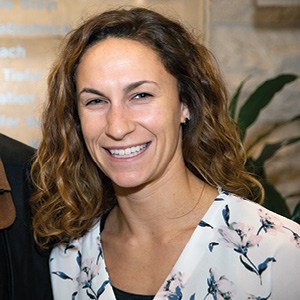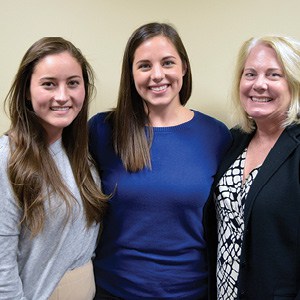Kaitlyn Oelsner, Wynston Hammack, and Patty Shelanski.
This Veteran’s Day four United Jewish Federation of Tidewater employees have a message for their bosses.
“Thank you.”
Military spouses Leigh Casson, Wynston Hammack, Patty Shelanski, and Kaitlyn Oelsner have full-time employment demonstrating their exceptional skills in donor relations, marketing, programs, and Foundation work. Their careers are on the rise, unlike the majority of military spouses they know who often don’t make it to the interview stage. If they do score an interview, they experience ‘interview bias’ where the hiring manager focuses more on when they’ll leave than what they bring.
Casson, Hammack, Shelanski and Oelsner are the exception, because in the military spouse employment arena, UJFT is exceptional.
Many of the issues raised in the Forbes article titled “The Military Spouse Employment Plight,” such as interview bias and resume gaps, are familiar to (and addressed by) Casson, Hammack, Shelanski, and Oelsner.
Leigh Casson, UJFT programs associate, has been a full-time employee for a year and is due to have her first child in December. Her work experience defies the odds for a military spouse. “When Robin Mancoll interviewed me, she didn’t bombard me with the typical 21 questions regarding my ‘limitations’ as a military spouse,” says Casson. “Typically, one of the first questions I’m faced with is ‘how long will you be here?’ followed by more concerned questions, as I dance around the truth which is that I’m not sure or, it will be a relatively short time.

Leigh Casson.
“I have always felt pressure to ‘fudge’ the truth which is that the military dictates my life and that my time at a job is limited. That wasn’t my experience when I applied at the Federation. It was clear during the hiring process that Robin was 100% focused on finding the right person for the job, even if that means they won’t be here for a long period of time.”
“As a military spouse, it can be tough to build a career,” says Kaitlyn Oelsner. She currently serves as the director of Philanthropy at the Tidewater Jewish Foundation. She has a background in government relations and healthcare philanthropy. “I feel so fortunate to be building my career instead of sacrificing it.”
“We are constantly moving and often coping with long deployments. I was grateful to find employment at TJF. It’s a great fit for me. I’m lucky to have the level of support that leadership here provides.“
Wynston Hammack is executive assistant to UJFT CEO Betty Ann Levin. Tammy Mujica, Levin’s previous executive assistant left after three years due to her husband’s reassignment. Levin hired Hammack to take Mujica’s place. “Betty Ann hired me to replace a military spouse she just lost. Do you know how rare that is? She went from one military spouse assistant to another and never made it a thing,” says Hammack.
“I could not believe my good fortune working with Tammy during my first year at the UJFT,” says Levin. “I wasn’t sure how we would ever find someone to assume her position, and then I met Wynston! She is a gem and has been such a wonderful addition to the community and the UJFT. Leigh, Wynston, Patty (who I had the pleasure of working with at JFS), and Kaitlyn are incredible additions to our team.”
“The level of talent some employers are missing out on (because they are not hiring military spouses) astounds me. Many military spouses I’ve encountered have multiple college degrees, come from diverse backgrounds, and are adaptable to any type of environment they are faced with,” says Hammack. “I am grateful to Betty Ann and to the Federation for taking a chance in hiring me, knowing that our lifestyle is largely transient.”
“Working for the Federation helped me to find community in a largely unfamiliar town,” says Hammack. “Seeing familiar faces in the Cardo, taking classes at JFit, and interacting with the amazing Tidewater community daily, makes the transition to a new duty station feel more like home.”
You’re hired. Now what?
“I would say the Federation has been exceptionally understanding of the challenges, which is so incredibly appreciated,” says Casson,
“The community I have gained working here made my time as a military spouse exponentially easier knowing that I have friends and coworkers that I can truly rely on. There are so many Jewish values that guide this organization. These values are alive in the United Jewish Federation of Tidewater, in my boss, and in the community. It is no surprise that the UJFT is such a supporter of military spouses and families.”
“My journey of employment evolved greatly over the 33 years I was an active duty spouse. I married my husband right out of college and we moved to Monterey, California. He was attending the Naval Post Graduate School, but there was also a huge Army base nearby at the time, Fort Ord,” says Patty Shelanski, UJFT Arts + Ideas manager.
“If you were under 40, it was assumed you were somehow tied to the Military, and in those days an employer could ask if you were a military spouse. Needless to say, I struggled finding a job.”
“I had a position with with a defense contractor in San Diego. I explained that my husband was in the Navy, but that we anticipated being in the area for at least five years. I was hired, and had a great few years with the company, BUT around the three-year mark I found myself not progressing in the direction I had hoped. My boss finally admitted that he was concerned that if I was the principal point-person on the project, I wouldn’t be able to follow through to completion because he believed my husband would get new orders at any time. As it turned out, we were able to stay in San Diego for almost 6 years,” she says.
“Once we left San Diego, and started our family, it was virtually impossible to find a job that matched my skill set. We moved frequently, and my husband was deployed almost constantly. Fifteen years lapsed before I actively sought employment again,” says Shelanski.
“When Betty Ann, then-CEO of Jewish Family Service, reached out to me to discuss a part-time position at JFS, I told her I couldn’t promise how long I would be in the area. I knew that my husband would be up for new orders, and at his position, would get very little lead time before having to move,” Shelanski recalls.
“Betty Ann didn’t hesitate, and said she would be thrilled to have me as long as I was able. That experience was the first time ANY potential employer had ever been so welcoming to me as an active duty military spouse. Not only was she willing to hire a military spouse and offer the flexibility that I needed at the time, she took the time to find out about this strange lifestyle we live, and showed genuine interest in knowing more. My two years at JFS were wonderful.”
And then, Shelanski’s husband got orders and they were off.
“Six years later, I’m back!” says Shelanski. “Again, Betty Ann reached out about an employment opportunity, and welcomed me with open arms. I’m not an active duty military spouse anymore, but when I arrived for my first day I was thrilled to see that Betty Ann had quite a few military spouses employed.”
Lisa Richmon

